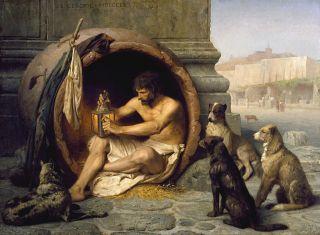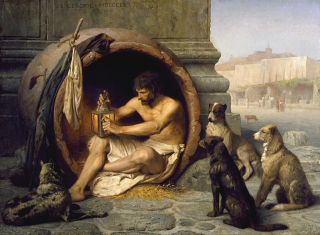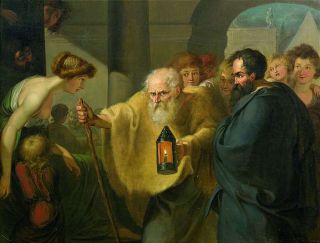Diogenes the Cynic: A Socrates Gone Mad? The life and philosophy, and radical freedom, of Diogenes the Cynic. Reviewed by Michelle Quirk

KEY POINTS-
- Diogenes and other Cynics took the asceticism of Socrates to an extreme.
- Diogenes lived in a storage jar, begged from statues, and walked backward in the street.
- He had not lost his mind but was trying to show people up as mindless hypocrites.

Diogenes the Cynic (c. 412–323 BCE) was a contemporary of Plato, who once called him "a Socrates gone mad."
After being exiled from his native Sinope for having defaced its coinage, Diogenes moved to Athens, took up the life of a beggar, and made it his mission to metaphorically deface the coinage of custom and convention—which, he maintained, was the false currency of morality. This story about defacing coinage may have been no more than a play on words, since, in Greek, the word for "money," nomisma, sounds like, and is derived from, the word for "custom," nomos—although it is also the case that archaeologists have unearthed defaced mid-fourth-century coins from Sinope.
Diogenes disdained the need for conventional shelter and other corrupting "dainties" and chose instead to sleep in a storage jar and get by on a diet of chickpeas and lupins. He used to beg for the bare necessities, including from statues—explaining to passers-by that he was thereby practising for rejection. He held that human beings had much to learn from the artlessness of dogs, which, unlike human beings, had not "complicated every simple gift of the gods." The term "cynic" derives from the Greek for "dog-like," kynikos.
Diogenes placed nature and reason firmly above custom and convention, which he held to be incompatible with happiness. It is natural for human beings to act in accord with reason, and reason dictates that human beings ought to live in accord with nature. Instead of wasting our substance in the pursuit of wealth or renown, we ought to have the sense and the courage to live like animals or gods, reveling in life’s simplest pleasures, which are also its greatest, without bond or fear. Thus, Diogenes taught that if an act is not shameful in private, it should not be shameful in public, either. Once, upon being challenged for masturbating in the marketplace, he replied, “If only it were so easy to soothe hunger by rubbing an empty belly.”
Although he privileged reason, Diogenes despised abstract philosophy of the kind practised at Plato’s Academy. When, to great acclaim, Plato defined a human being as "an animal, biped, and featherless," Diogenes plucked a fowl and brought it to the Academy with the words, “Behold! I have brought you Plato's man.” Plato consequently refined his definition, adding to it "with broad nails." One day, Diogenes asked Plato for a handful of figs from his garden. When Plato had a whole bushel sent out, he muttered, “Typical Plato.” Like Socrates, Diogenes favoured living dialogue over the dead word. When a certain Hegesias asked to be lent one of his writing tablets, he replied, “You are a simpleton Hegesias; you do not choose painted figs, but real ones; and yet you pass over the true training and would apply yourself to written rules.”

Diogenes was not easily impressed by his fellow men and women, not even by Alexander the Great, who, according to an apocryphal story, came to visit him one morning while he was basking in the sun. When Alexander asked him whether he might do anything for him, he replied, “Yes, stand out of my sunshine.” To his credit, Alexander still declared, “If I were not Alexander, I should wish to be Diogenes.” The old dog used to stroll around Athens in broad daylight brandishing an ignited lamp. Whenever curious people stopped to ask what he was doing, he would reply, “I am just looking for a human being.” He would also walk backward in the street or walk into the theatre against the flow of people leaving. When a large enough crowd had gathered around to laugh at him, he would turn on his heels and say, “Why do you mock, when you’ve spent your whole life walking backwards? I, at least, am able to turn around.”
After his death in the city of Corinth, the Corinthians honoured him with a pillar surmounted by a dog of Parian marble. The Cynics exerted a strong influence on Zeno of Citium, the founder of Stoicism, who began his career as a Cynic.
Neel Burton is author of Stoic Stories, which is part of the Ancient Wisdom series.
- Questions and Answers
- Opinion
- Motivational and Inspiring Story
- Technology
- Live and Let live
- Focus
- Geopolitics
- Military-Arms/Equipment
- Security
- Economy
- Beasts of Nations
- Machine Tools-The “Mother Industry”
- Art
- Causes
- Crafts
- Dance
- Drinks
- Film/Movie
- Fitness
- Food
- Games
- Gardening
- Health
- Home
- Literature
- Music
- Networking
- Other
- Party
- Religion
- Shopping
- Sports
- Theater
- Health and Wellness
- News
- Culture

